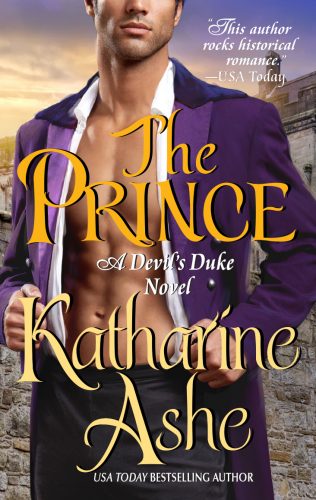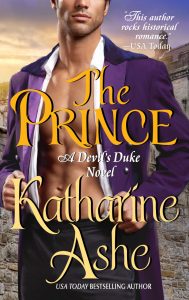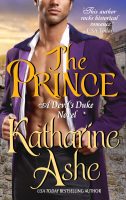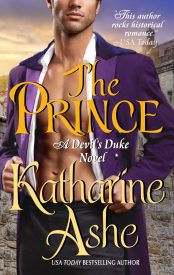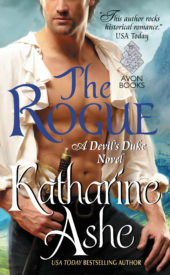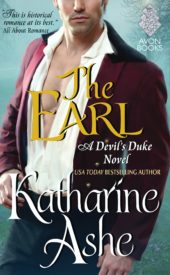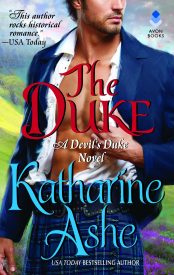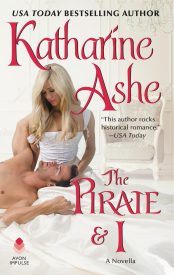The Prince
Book 4 in the Devil’s Duke Series
The temptation of her lips…
Libby Shaw refuses to accept society’s dictates. She’s determined to become a member of Edinburgh’s all-male Royal College of Surgeons. Disguising herself as a man, she attends the surgical theater and fools everyone—except the one man who has never forgotten the shape of her exquisitely sensual lips.
…will make a prince say yes to her every desire.
Forced to leave his home as a boy, famed portraitist Ziyaeddin is secretly the exiled prince of a distant realm. When he first met Libby, he memorized every detail of her face and drew her. But her perfect lips gave him trouble—the same lips he now longs to kiss. When Libby asks his help to hide her feminine identity from the world, Ziyaeddin agrees on one condition: she must sit for him to paint—as a woman. But what begins as a daring scheme could send them both hurtling toward danger… and an unparalleled love.
Read an Excerpt
STARRED REVIEW: "Ashe strikes gold."

The Prince
September 1825
Surgeons’ Hall
Edinburgh, Scotland
Neck cloths were a lot tighter than she had imagined. And trousers pinched a person right up the center of where she least wanted to be pinched.
But no one had noticed her. Even the students on the benches to either side, murmuring to their companions about the dissection in the center of the U-shaped operating theater, had not glanced twice at her.
Obviously the whiskers had been a stroke of brilliance.
Nevertheless, Libby Shaw kept her shoulders hunched and head bent, peeking at the demonstration from beneath the concealing rim of her cap. As the surgeon peeled away the muscle to expose bone, a shiver of pleasure fanned through her.
She had sat in this theater before to watch public dissections and surgeries. Disguised as a man now, it all felt different: the medical men with their wise brows and hands that worked miracles; the scratching of students’ pencils in notebooks; the cringes of the curious public drawn to the lecture; and the stench of the flesh on the table, slowed in its natural decay by the cool cellar in which the surgical assistant stored it each afternoon to preserve it for the following day’s lecture.
For a sennight already, Edinburgh’s most celebrated surgeons had been performing a system-by-system dissection, but Libby had not bothered attending until today, the day reserved for her favorite part: the skeletal system. The human skeleton was sturdy, stable, such a pleasure to study.
“That is the fibula,” the young man on her left whispered to his companion.
“It is?” the other whispered uncertainly.
No.
Libby bit her lips together. The whiskers disguised her face, not her voice.
“Of course, numbskull,” the first one said. She recognized that haughty tone. She had met plenty of this sort when her father invited his students to dinner. They thought their arrogance impressed her.
“I’ve been to dozens of these dissections already,” he added.
Yet he did not know a fibula from a tibia.
“What’s that?” the other whispered, pointing.
The soleus.
“The tibialis anterior,” the haughty one said. “Clearly you haven’t read Charles Bell’s A System of Dissections.”
Clearly he hadn’t either.
Their whispers had grown louder. Libby inched forward on the bench and turned her ear toward the floor below.
“Watch, Pulley,” the haughty one said. “Now he will use the lithotomy forceps to pluck out the muscle.”
Libby jerked her chin aside.
“He will not,” she whispered in a low pitch . “He will use the curved knife to protect the muscle while exposing the bone. Now do be quiet so the rest of us can hear.” She turned her face back toward the stage. She wasn’t here to admonish ill-informed students. She was here to learn.
With each new revelation the lecturing surgeon offered, Libby scribed a detailed note, carefully lining up each sentence at the left margin, to be easily readable later. Finally the surgeon draped a linen cloth over the table, and the hall erupted in applause.
“This calls for a pint,” the haughty student said, as though he’d done the dissection himself.
“Invite the new lad?” his friend said with a glance at her as she closed her notebook and stood.
The arrogant lip curled. “The riffraff can find their own pub.”
They moved off.
“Dinna fret o’er Cheddar,” a youth said cheerfully beside her. “He’s a bushel o’ mean stuffed into a barrel o’ privilege. Family’s got money an’ he’s clever as a fox. Doesna think he’s got to be decent to anybody. Good on you to take him down a peg, lad.”
She could not pretend the youth was not speaking to her. Reaching up, she touched the brim of her cap. For weeks she had studied men’s gestures, as well as their gaits and facial movements, then practiced them before a mirror.
“I dinna know you,” the youth said. “An’ I know everybody.” He thrust out his hand. The mop of ginger curls over his pale freckled face jiggled. “Archibald Armstrong. My mates call me Archie.”
She turned away.
“Here now!” he said, scanning Libby’s fine coat and trousers. “You’re no’ too smart to shake a fellow’s hand, are you?”
There was no avoiding it. Libby grasped his hand and shook it hard.
“Smart,” she mumbled. “Joseph.”
“Fine grip you’ve got there, Joe! I always say you know the measure o’ a man by his handshake. Matriculating this session?”
In her dreams.
She nodded.
“Excellent,” Archie declared. “Always happy to meet a bloke cleverer than me, ’less it’s Cheddar,” he said with a wink, and clapped Libby on the shoulder, sending her lurching forward. “The lads are off to the Dug’s Bone for a pint. Got to wash away the stink,” he said jauntily. “Join us.”
“Obliged,” she said, and he moved off.
Euphoria bubbled up in her. All three students had believed she was a man!
The disguise did not, however, solve her greatest problem: finding a surgeon with whom to apprentice. For that she needed connections in Edinburgh’s surgical community. Those connections would also pave the path to enrolling in courses on anatomy, surgery, and chemistry to augment her apprenticeship. Miss Elizabeth Shaw, daughter of renowned forensic physician John Shaw, had those sorts of connections in spades. The newly created and entirely friendless Joseph Smart did not.
But women were not allowed to apprentice as surgeons. Thus her disguise.
Below, only two students were asking questions of the lecturing surgeon. Questions crowded her own head, yet boys like Archie Armstrong didn’t even bother staying to learn more.
As Elizabeth Shaw, she had never met this surgeon. She could chance asking her questions without being recognized. Tucking her notebook beneath her arm and starting toward the stair, she cut a swift glance across the thinning crowd.
Her steps faltered.
A man sat across the theater, alone as the tiers emptied.
It was not because he was the only person Libby recognized in the place that she abruptly could not move. For he was not. She had noticed several of her father’s friends in the crowd.
And she did not halt because this man was attractive; for he was, with a strong tapering jaw, black hair swept back from his brow, and deep-set eyes. His arms clad in a fine coat and crossed loosely over his chest were muscular, and the crisp white of his cravat shone brilliantly against his skin. Libby had never particularly cared about external beauty; her interest was a body’s health. And she had been stared at before. It was not due to his dark gaze trained upon her that she remained paralyzed.
Her feet would not move now because in that gaze was thorough recognition. He knew her.
They had met only once, two and a half years ago, exceedingly briefly. Yet the gleam in his hooded eyes now told her that he knew her at this moment to be Elizabeth Shaw.
With a regal nod he offered her a slow, confident smile of pure deviltry.
Panic seized her. It required only a single person to unmask her. If she did not move swiftly now, this man with the keen eyes and dangerous smile would.
* * *
Except for the whiskers, she was perfect.
Watching her across the theater, Ziyaeddin wondered if she knew the whiskers were horrendous. But they helped serve her purpose: none of the men here realized that a female hid as one of them. None save he.
For two hours the attention of every person in the theater had been on the demonstration. Although Ziyaeddin preferred the earlier stages of a surgical dissection, when the body was whole and the muscles still plump with blood, he appreciated the entire series. A man could not properly depict the exterior without knowing what lay beneath.
Also, Edinburgh’s medical community was large, sophisticated, and prosperous. He had friends as well as patrons among the men here. It was useful to occasionally be seen in public.
And then there was the girl.
With a sober face she had listened to the lecturing surgeon, scribbling in a notebook set atop her trouser-clad knees, making no move that might reveal her femininity. But he knew the girl beneath that disguise. He had once encountered her at Haiknayes Castle, the home of the Duke and Duchess of Loch Irvine. He remembered her perfectly.
Her fingers clutching pencil and notebook were long with very short nails, and darker than the visible bits of her fair chin and cheeks. The nose was neither large nor pert. The eyes, shaded by her hat, were almond-shaped, narrowing in the centers at equivalent arcs toward the dip at the bridge of her nose, the left a bit smaller than the right. The lashes and eye color he could not discern at this distance, but he knew them to be, respectively, golden brown and brilliant blue. The whiskers obscured her lips.
Those lips had given him trouble.
Considerable trouble.
Her father, John Shaw, was a respected physician. Ziyaeddin considered the likelihood that Dr. Shaw was aware his daughter now attended a surgical dissection dressed in men’s clothing. From even the little Ziyaeddin knew of Miss Elizabeth Shaw: probably not.
She gazed with longing at the stragglers lingering about the lecturer. She mustn’t realize how obviously her face showed that longing. He should probably tell her. That, and he needed to have another look at those lips.
Those lips.
Abruptly she turned her head and met his gaze, and the beautifully mobile features went stone still. Recognition sparked in the blue.
Aha. So she remembered him. No doubt she treasured the picture of her face that he had drawn at Haiknayes, probably keeping it in an intimate location: her bedside table or between the pages of her diary. Portraits by “the Turk” were coveted by ladies throughout Scotland and England. It was part of his mystique to rarely do likenesses of individual women, so that when he did they were especially valuable.
He inclined his head.
With a vexed glance at the lecturing floor below, she hurried from the hall.
Taking up his walking stick, he went out, greeting acquaintances along the way. The usual pain assailed him; he could never sit for long without it. He ignored it. He had far more interesting things to ponder now, two things: an upper lip and a lower lip.
By the time he came onto the street she had disappeared. Amidst the bustle of pedestrians, horses, and vehicles, he could not see her. Then, abruptly, through the window of a bookshop, he did.
A youth with a tight hat and too many whiskers stared at him above the edge of an open volume. The fire in the intelligent eyes dared him to reveal her.
Opening the door, he entered and looked into Elizabeth Shaw’s scruffy face.
The hat was a clever contrivance, and like her cravat and coat, both of fine quality and understated. But the moustaches were all wrong, fashioned of goat’s hair, and too coarse and ashy, and did not suit the golden strands of hair visible betwixt cap and collar. To conceal her smooth skin she had exaggerated the side whiskers till they were as thick and long as a sailor’s.
He bowed. “Good day.”
She ducked her head, moved around him, and darted out of the shop.
He followed.
As he half expected and half hoped, she was waiting for him in an alley not far away. Entering the secluded close he went toward her.
“You mustn’t tell my father,” she said without preamble. It did not surprise him. When they had spoken so briefly at Haiknayes she had been unconcerned with regular manners too.
“The color of the whiskers is unsuitable,” he said.
Her nose crinkled. “It is?”
“It needs more yellow.” Yellow ochre. And perhaps a touch of raw sienna.
She seemed to consider this. “I suppose you would know that, being a portrait artist.”
“I would indeed,” he said, bridling his amusement.
“Credible whiskers are remarkably difficult to come by.” There was no anger in the eyes now, only earnest concern. “How did you recognize me?”
He stepped forward, closing the distance between them so that the precise shape and hues of her lips became clear to him—beautiful lips: nothing like the current fashion for red bows, instead wide and lushly pink.
“I have cause to know these lips well.” Yet not well enough.
Before his encounter with Elizabeth Shaw at Haiknayes Castle, he had never seen a woman’s lips and wanted immediately to touch them. Draw: yes. Paint: certainly. Touch: never.
“And these eyes,” he added, because she was an unusual little woman and she did something to him—something alarming yet wholly pleasurable. She quickened his pulse.
And she made him want to stand in an alleyway chatting about false whiskers.
“At Haiknayes,” she said, “you drew my face perfectly after seeing me only once.”
Not perfectly. But close.
“You remember,” he said.
“Of course I remember. I am not in my dotage, and you gave the picture to me. My father believed one of my friends drew it. He put a frame on it and hung it in the parlor. I pretended it fell off the wall while being dusted and the glass shattered. I told him I would take it to the shop to have the glass replaced but I threw it in the trash bin.”
He laughed.
Her brows perked. “You are not offended?”
“Of course not.”
“Truly?”
“If I wished, I could draw your face a hundred more times.”
She blinked. “I must go.” She glanced toward the alley’s end. “I’ve elsewhere to be just now.”
“A gentlemen’s club?” He folded his arms. “Or a gaming hell? Perhaps the local public house?”
The lips twitched. “That is the simplest kind of humor.”
“Well, you don’t plan to attend a ladies’ sewing circle in this ensemble.” He allowed his gaze to travel down the heavy coat and trousers. She had most certainly bound her breasts, but there was no disguising the subtle flare of her hips. “Do you?”
“You are absurd. You won’t tell anybody, will you?”
She had no reason to expect his discretion. And he was enjoying the dart that formed at the bridge of her nose, the shape of it like a pair of stalwart lovers forever separated by a mountain. Her beauty was conventional, a mingling of Scottish clarity and English delicacy. Yet the changeability of her features fascinated him.
He found any sort of freedom of motion maddening—and inspiring.
“I should like to know the reason for your disguise,” he said.
“I wanted to assess whether I could pass as a man,” she said in a tone that suggested she thought him a simpleton. Yet her eyes shone not with insult but sincerity.
“Congratulations for succeeding,” he said. “Almost.”
“I might as easily ask what you were doing there.”
“Enjoying the vision of a pretty girl disguised as a youth.”
Like sunlight sparking off the Mediterranean, her eyes flared. Abruptly she moved past him. He watched her lithe legs and straight back and stride that was far too confident for a woman.
“Miss Shaw, forgive my impertinence.”
She paused. “I saw the portrait you did of the duke and duchess. It is very good.”
That portrait of the Duke and Duchess of Loch Irvine was not “very good.” It was brilliant. Light and dark. Mystery and familiarity. Action and peace. Passion and reason. He had painted every facet of the pair in sublime balance.
Looking into the bright eyes now, he saw that Miss Shaw was well aware of this.
So this little woman of the earnest brow knew how to tease too. He should have anticipated that.
His body’s reaction to this realization was, however, something of a surprise. Perhaps those slender legs were the trouble. Or thoughts of her breasts. Or the plump curve of her lower lip. Or the fact that she was standing before him dressed as a boy, duping everyone, yet apparently expecting him to keep her confidence…
End of Excerpt
The Prince
is available in the following formats:

Connected Books
The Prince
is Book 4 in the Devil’s Duke Series
The full series reading order is as follows:
- Book 1 The Rogue
- Book 2 The Earl
- Book 2.5 The Pirate & I
- Book 3 The Duke
- Book 4 The Prince

Reviews
*Best Romance Books of 2018*
— Amazon Editors' Choice
*Starred Review*
Ashe strikes gold in her fourth Devil's Duke Regency... Ashe allows desire to build slowly between the two, giving them time to demonstrate goodness, honor, and love before they act on their long-simmering passions. A...thoroughly pleasurable historical.
*Starred Review*
Few romance novelists can conjure such lush, erotic stories alongside substantial historical detail and moral heft. A Georgian-era romance that enthralls and impresses up to the last page.
— Kirkus Reviews
Desert Isle Keeper
Everything about this union sparkles, from the ultra slow-burn of their friends-to-lovers relationship, to Ms. Ashe’s remarkable characterization of her two complex, flawed and fascinating principals, and the compelling (and mysterious) subplot that runs throughout. … The chemistry between our two principals is intense ... If this novel doesn’t make you swoon, I don’t know what will.
This is an incomparable romance. It is incomparable historical fiction. And it is wordsmithing of the finest kind.
Best of the Year
[A]n emotionally intense story of two complex people who are more than the labels others would use to define them ... I've been singing Katharine Ashe's praises since early in her career, but this is an extraordinary book even from this talented author ... If you like historical romance that makes you feel, makes you think, and leaves you considering how soon you can plan a reread, I highly recommend The Prince.
Top Pick!
Wonderful, heartbreaking, amazing... Ashe just keeps getting better and better.
— Night Owl Reviews
Sparkling ... delectable.
— Library Journal
[T]op notch ... captivating characters and heart-melting passion.
— Booklist

